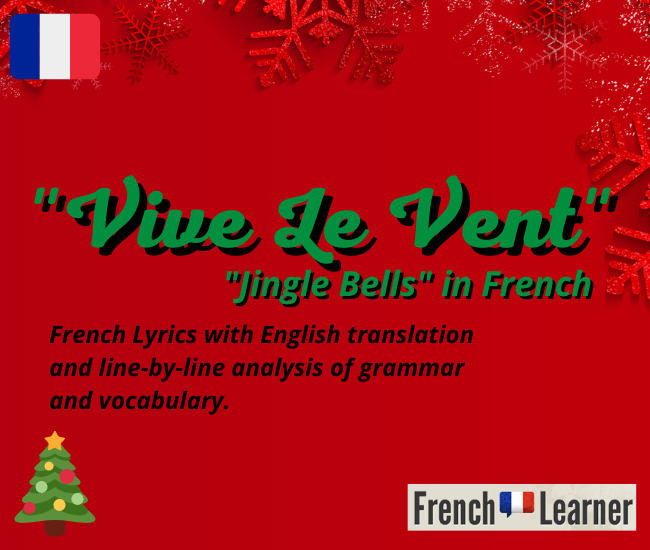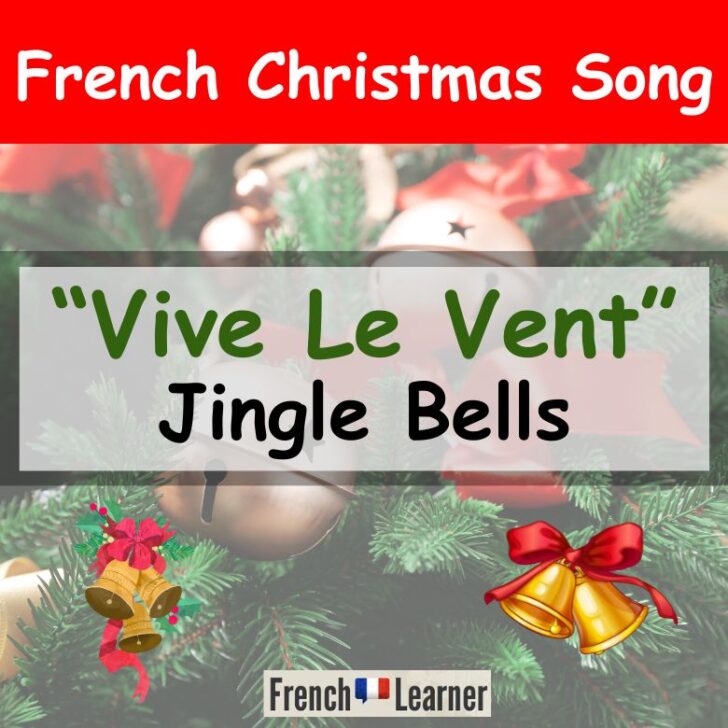“Vive Le Vent” (Meaning: Long live the wind; Pronunciation: viv lə vɑ̃) is the French name of the popular Christmas song, Jingle Bells. While the tune of the French version is the same, the lyrics are totally different. This post will explore the French lyrics of Vive Le Vent and provide line-by-line analysis of grammar and vocabulary.
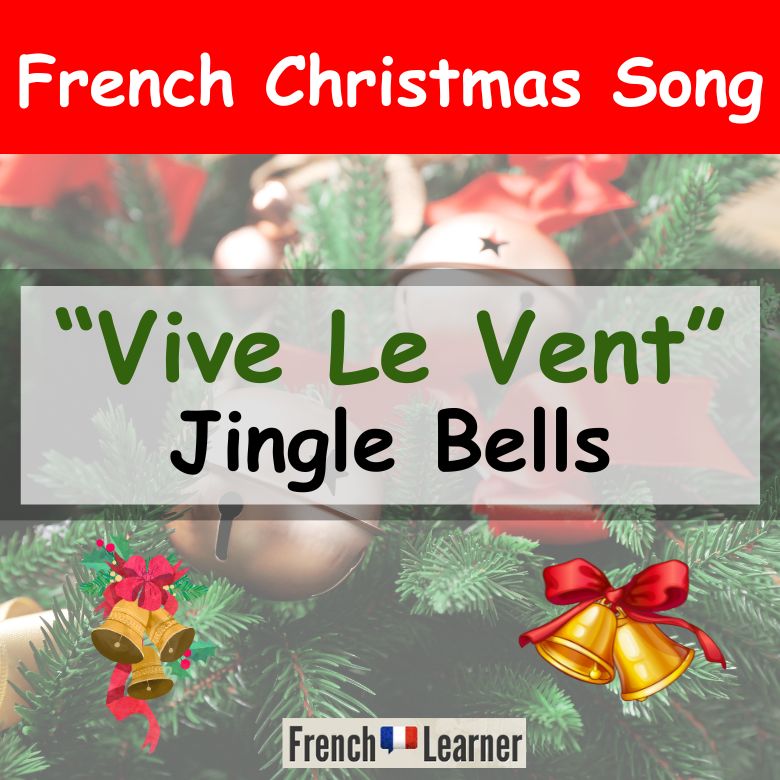
Vive Le Vent French Lyrics Synopsis
Unlike the English version, Vive Le Vent really has nothing to do with the ringing of bells. The lyrics portray the images of the holiday season.
For example, the green Christmas trees (les grands sapins verts), snowballs (les boules de neige), candles and bells (les bougies, les cloches) and holiday meal (Partout la table est prête; everywhere the table is set).
Listen to the song “Vive Le Vent”
The following video for “Vive Le Vent” on YouTube has over two million views and is sub-titled in French.
You can also listen on Spotify!
Line-by-line analysis of vocabulary and grammar
Vive le vent, vive le vent
The first line and title of the song translates to “Long live the wind, long live the wind”. “Vive“ in French translates to “long live!”. A famous quote from former French president, Charles de Gaulle, was “Vive la république et vive la france!” (Long live the Republic and long live France!).
Qui s’en va sifflant, soufflant
This line translates to “Which goes whistling, blowing”. The word “qui” is a relative pronoun and translates to “which” and “that”. This page on our site covers relative pronouns in detail. The reflexive verb “s’en aller“ means to leave or go. “Sifflant” (whistling) and “soufflant” (blowing) are both examples of present participles, meaning the present progressive forms of the verbs ending in -ing.
Dans les grands sapins verts, oh !
This line translates to “Through the tall green Christmas trees, oh!”. In French, the adjective “grand“ can translate to both “big” and “tall”. The noun “sapin“ translates to both “pine tree” and “fir tree” but is used to mean “Christmas tree”.
Vive le temps, vive le temps, Vive le temps d’hiver
We translated these lines to “Long live the season, long live the season, Long live the holiday season”. The word “temps“ commonly translates to both “time” and “weather”. However, we loosely translated the word “temps” to “holiday season” in the context of the song.
Boules de neige et Jour de l’An
This line translates to “Snowballs and new year’s day”. “Boule de neige“ means snowball. Interestingly, “l’effet boule de neige” means “snowball effect”. “Le Jour de l’An“ refers to the New Years Day.
Et Bonne Année grand-mère !
This line translates to “and happy new year Grandma!”. This page on our site explains how to say “Happy New Year” and “Merry Christmas” in French.
Sur le long chemin
We translated this line to “Along the long road”. The preposition “sur“ means “on” or “above”, but we translated it to “along” for the context of the line. The word “chemin” can translate to “road”, “path” or “way”.
Tout blanc de neige blanche
This line translate to “All white from the white snow”. “Neige” means snow in French and “blanc/blanche” means white. This page on our site gives a list of weather expressions and this page covers the French colors.
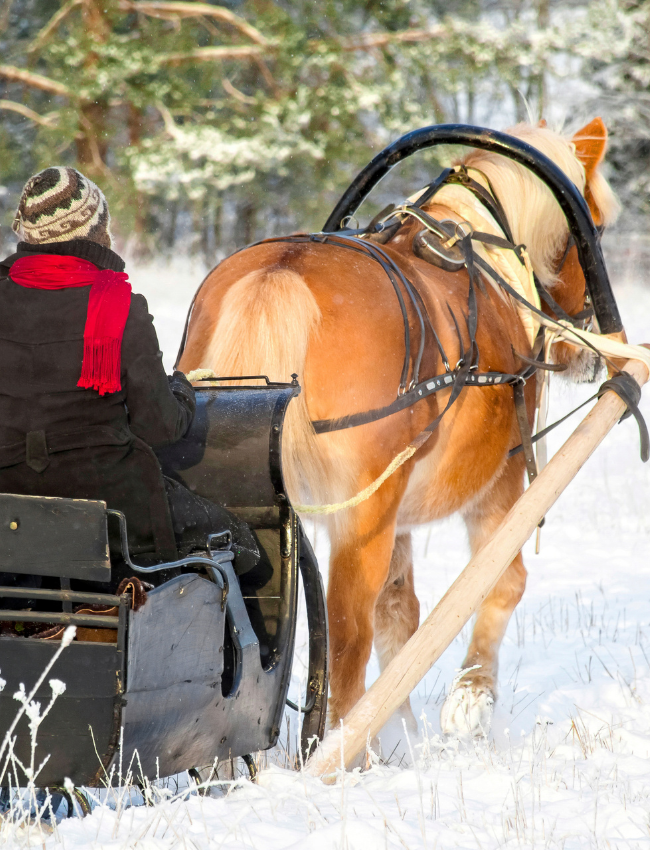
Un vieux monsieur s’avance
We translated this line to “Walks an old man”. In French, “vieux/vieille“ means old. “Un monsieur” means a man (un homme) while “Monsieur“ on its own means “sir. The reflexive verb “s’avancer“ means to move forward. We translated it loosely to “to walk” for the context of the lyrics.
Avec sa canne dans la main.
This line translate to “With his cane in his hand”. Notice “his hand” is written in French as “la main” (literally “the hand”). French uses the definite article (le, la, les = the) to refer to body parts. This page on our site covers the definite and indefinite articles (un, une, des = a/an, some) in detail.
Et tout là-haut le vent
We translated this line to “And the wind way up there”. “Là-haut“ has several translations including, “up there”, “up above” and “upstairs”.
Qui siffle dans les branches
This line translates to “Which whistles in the branches”. The verb “siffler“ means “to whistle”.
Lui souffle la romance
We translated this line to “Blows the romantic tune on him”. The word “lui” in this context is an indirect object pronoun and means “at him” or “on him”. This page on our site covers “lui” in detail and this page covers object pronouns. “Romance“ can mean both “romance” and a “romantic song”.
Qu’il chantait petit enfant, oh !
This line translates to “That he sang as a young child, oh”. “Chantait” can translate to “used to sing” or “was singing” and “sang”. This is “chanter” (to sing) in the imperfect tense, a past tense used for past events which have undefined start and stop times. This page on our site covers the imperfect tense in detail.
Joyeux, joyeux Noël
This line translates to “Merry, merry Christmas”. The page on our site discusses different ways to say Merry Christmas in French. Both “joyeux/joyeuse” and “heureux/heureuse” mean happy. This page covers various way to say “happy” in French.
Aux mille bougies, Qu’enchantent vers le ciel
This line translates to “To the thousand candles, Which delight toward heaven”. The verb “enchanter“ means “to delight” or “to enchant”. The expression “enchanté” is used to express “nice to meet you“. The preposition “vers“ means “towards”, “to”, “at” or “in the direct of”.
Les cloches de la nuit
This line translates to “the bells of the night”. “Nuit” means night in French. This page on our site covers various ways of how to say “good night“.
Qui rapporte aux vieux enfants, Leurs souvenirs d’hier, oh
These two lines translate to “Which brings to old kids, Their memories of yesterday, oh!”. The verb “rapporter“ means “to bring” back, as in to bring something back home. The noun “souvenir“ means “memory” while the reflexive verb “se souvenir” means “to remember”.
Et le vieux monsieur, Descend vers le village
These two lines translates to “And the old man, Goes down toward the village”. It’s possible that the “vieux monseiur” (old man) is a metaphor for Santa Claus, which in French is “Père Noël“.
C’est l’heure où tout est sage
This line translates to “It’s the time when everyone is good”. The word “heure“ literally means “hour”. This page on our site covers telling time in French. The French adjective “sage“ means both “well behaved” and “wise”.
Et l’ombre danse au coin du feu
We translated this line to “And the shadow dances near the fire”. The word “ombre“ means both shadow and shade. “Coin“ means both “corner” and “local area”.
Mais dans chaque maison, Il flotte un air de fête
These two lines translate to “But in each house, There floats a festive air”. The verb “flotter” translates to “to float”, “to flutter” and “to rain/pour”.
Partout la table est prête
We translated this line to “Everywhere the table is set”. The adjective “prêt“ means “ready”. However, we translated it to “set” for the context of the lyrics.
Et l’on entend la même chanson, oh !
This line translates to “And you hear the same song, oh!”. The French personal pronoun “on” literally means “one” but has many translations and usages including “you” or “people in general”. This page on our site covers “on” in detail.
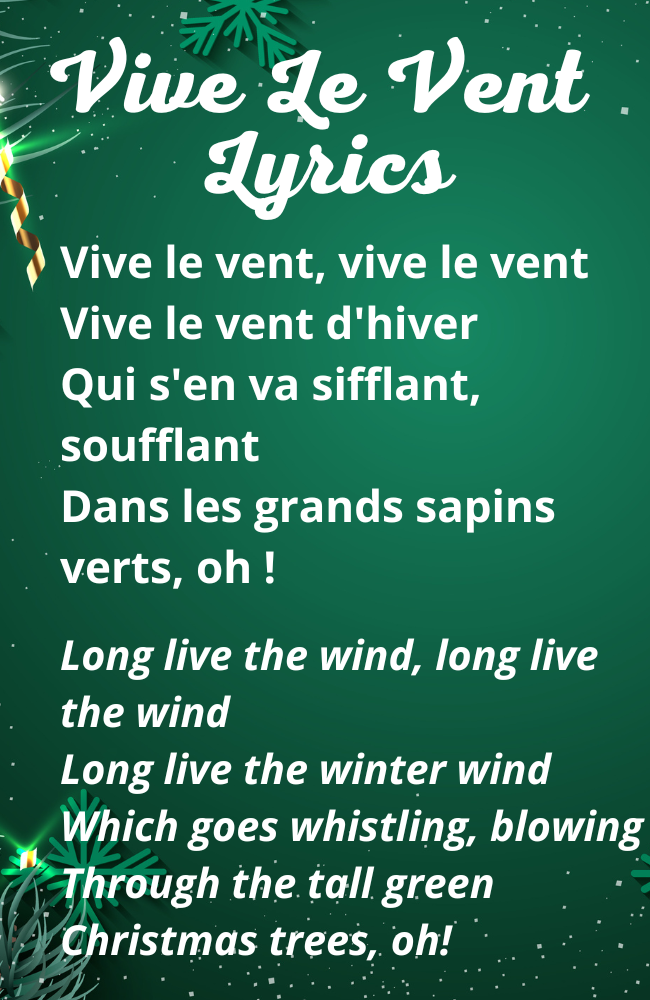
Vive Le Vent (Jingle Bells) — French Lyrics & English Translation
Vive le vent, vive le vent
Vive le vent d’hiver
Qui s’en va sifflant, soufflant
Dans les grands sapins verts, oh !
Long live the wind, long live the wind
Long live the winter wind
Which goes whistling, blowing
Through the tall green Christmas trees, oh!
Vive le temps, vive le temps
Vive le temps d’hiver
Boules de neige et Jour de l’An
Et Bonne Année grand-mère !
Long live the season, long live the season,
Long live the holiday season
Snowballs and new year’s day
and happy new year Grandma!
Sur le long chemin
Tout blanc de neige blanche
Un vieux monsieur s’avance
Avec sa canne dans la main
Et tout là-haut le vent
Qui siffle dans les branches
Lui souffle la romance
Qu’il chantait petit enfant, oh !
Along the long road
All white from the white snow
Walks an old man
With his cane in his hand
And the wind way up there
Which whistles in the branches
Blows the romantic tune on him
That he sang as a young child, oh!
Joyeux, joyeux Noël
Aux mille bougies
Qu’enchantent vers le ciel
Les cloches de la nuit
Vive le vent, vive le vent
Vive le vent d’hiver
Qui rapporte aux vieux enfants
Leurs souvenirs d’hier, oh !
Merry, Merry Christmas
To the thousand candles
Which delight toward heaven
The night’s bells.
Long live the wind, long live the wind
Long live the winter wind
Which brings to old kids
Their memories of yesterday, oh!
Et le vieux monsieur
Descend vers le village
C’est l’heure où tout est sage
Et l’ombre danse au coin du feu
Mais dans chaque maison
Il flotte un air de fête
Partout la table est prête
Et l’on entend la même chanson, oh !
And the old man
Goes down toward the village
It’s the time when everyone is good
And the shadow dances near the fire
But in each house
There floats a festive air
Everywhere the table is set
And you hear the same song, oh!
Discover French Christmas songs:
- Top 10 French Christmas Songs
- Noël Blanc (Song – White Christmas)
- Douce Nuit – Sainte Nuit (Silent Night)
- Minuit Chrétien – O Holy Night
